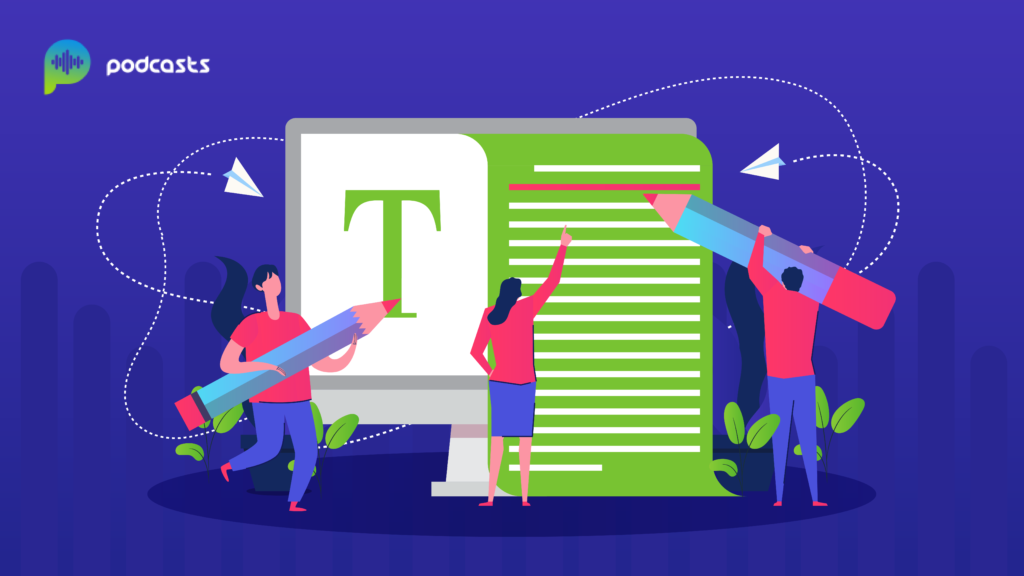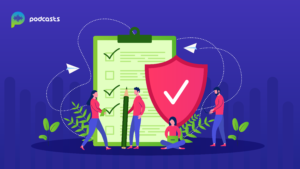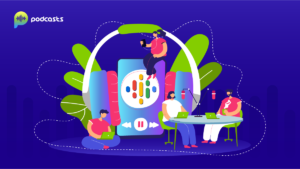Podcasts are a great way to build an audience and get your point of view across to thousands. The best way to prepare for a podcast would be to put together a podcast assets guide is a blueprint or structural plan to how you will design and organize your podcast, what equipment you need, the surrounding artwork and music you need, your podcast format, length, name, thumbnail, recording equipment required, the acoustic space you will hold your podcast in and more.
A podcast assets guide can be as short as a few pages or longer than “War and Peace.” It’s ultimately up to you, but there are several essential elements.

Determining Your Topic
You want your podcast topic to be not too narrow, nor too broad. If you choose a topic such as hiking, camping, fishing, and kayaking, while it does fit the interest of thousands of people, a fisherman is more likely to turn to a fisherman podcast, and a kayaker will navigate toward kayaking podcasts.
However, if you choose a topic that’s too narrow, such as “Fishing with Ugly Stiks,” you may be so narrow that your audience cannot grow.
Naming Your Podcast
You want to spend a good amount of time choosing a name. “Mike’s fishing tips” may sound perfect if your name is Mike and your topic is fishing, however, be creative and consider stealing a bit.
Celebrity Dax Sheppard has a podcast entitled “Armchair Expert.” What about a fishing podcast entitled “Armchair Fishing Tips.” Armchair is one of those words that is quite appealing, implying an expert that doesn’t take themselves too seriously.
The next step is seeing if you can also use the title as a domain name, and if it’s available, buy it.
Determining the Format
Some people love to wing it, some people write and prepare tight, scripted podcasts. Some prefer a call-in or interview format, others want the attention strictly upon themselves. Regardless of what you choose, remember, it’s jarring and difficult for dedicated listeners to change your format later. So choose wisely.
Determining the Show Length
Concerning length, time spent listening is the key.
Around 22% of listeners stay with a podcast that exceeds an hour, 34 percent from 30 to 60 minutes long, and 37% are 15 to 30 minutes in length.
So the important fact here is to not be boring and load your shows with interesting content early because regardless of length a substantial amount of people will leave before the podcast is done.
What Will Your Show Sound Like?
The above elements will primarily be in your pre-guide blueprint only. After that, its time to produce on paper, what your show will sound like. Examples include: Will you have a beginning show teaser and by whom?
Some shows, for example, do the Ed McMahon approach, where they have an announcer introduce the name of the show, and today’s topic such as: “Live from his man-cave in Manhattan New York, today on Live With Mike, your host Michael Ocean interviews famed UFC Fighter, Chuck Lidell.”
- Your podcast intro theme music
- Your Intro
Most experts agree you should have a standard intro such as: “Welcome to Live with Mike. I’m your host, Michael Ocean. This is Tuesday, November 26th, and your listening to the 207th episode of Live With Mike, hosted on Youtube, Facebook, and Twitter every Tuesday evening at 7 p.m Eastern Standard time.” - Any ad spots and their placement
- Interviews
- A Call to Action
If you like us, be sure to review us on iTunes, and like us on Facebook - Outro Music
Of course, you can structure your show any way you want, but writing it down gives you a visual structure for the show.
Other Things You’ll Want to Create
- Cover art is very important to your success
When people go through a podcast app, the cover art is the first and often last you’ll see of potential listeners. Be sure it’s simple, uncluttered and striking. - Consider a WordPress blog dedicated to your podcast.
- Have good quality editing equipment to edit your pod
Some people do their podcasts live, but this isn’t recommended for beginners who need to spend a lot of time learning the sound recording process. - Consider a professional intro host
You come off looking way more professional if you hire a professional to introduce your show, even if you need to pay $200 to do so. It’s well worth the money - Pay to get a quality intro and outro music
Some people love to copyright infringe on other people’s music, which can be easily taken from sources such as YouTube. Don’t. There are plenty of sources such as Melody Loops or Royalty-Free Music, that are quite reasonable. - Study podcasters and learn from the experts
If you want to get really good, not only listen to dozens of podcasts to get a feel for how they are but also check out our various articles on everything podcast. They go in-depth about many things such as choosing equipment, structuring your show, and building up and expanding your audience, the advice I prefer to leave to the experts.
If you build it and have the passion, maybe the listeners will come along. Nobody is saying it’s effortless, that you won’t struggle, won’t have challenges, or that you will become rich or famous overnight. However, if you have a passion for something and want to influence thousands, perhaps even millions of others, a podcast is a great way to start.












